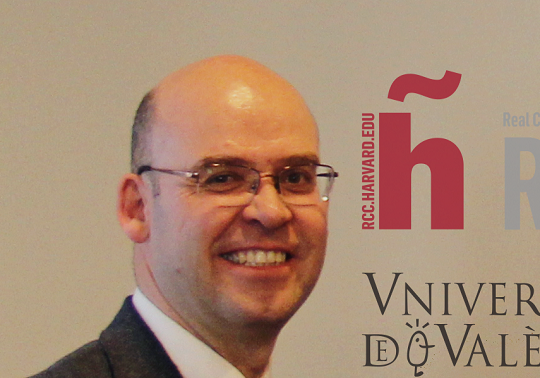
Manuel Guillén, professor at the University of València, defends in a presentation at the Massachusetts Institute of Technology (MIT) the need to understand and promote the "logic of gift" in the government of organizations.
On July 7th, Professor Manuel Guillén, member of the UV Department of Business Administration Juan José Renau Piqueras, and Director of IECO-UV Chair of Business Ethics, was invited to give a talk at the MIT MediaLab.
The well-known Media Lab is an interdisciplinary research laboratory, and is part of the MIT School of Architecture and Planning. It is located in the Wiesner building, designed by the architect Ieoh Ming Pei. The laboratory opened its doors in 1985 and has been dedicated since its beginnings to research projects, in which multimedia design and technology converge. More recently, it has also focused its interest in the design and creation of technologies that deal with social causes.
The Scalable Cooperation Group at MIT Media Lab is one of the more than thirty research groups of the Lab. In this Group, about a dozen researchers are studying how technology is changing the nature of human cooperation, and working on designing radically new ways of expanding cooperation. Among the most popular research projects of the Group are the "Promotion of Cooperation", the "Human-Machine Cooperation" and the "Ethics of autonomous vehicles".
The 7th of July, and as part of the conferences and training sessions organized by the Scalable Cooperation Group, Professor Guillén, from the University of Valencia, was invited to give a session. The title of the presentation was: "The logic of gift: inspiring behaviors in the Organizations beyond the limits of duty and exchange." This title coincided with that of the article published last year by the Business Ethics Quarterly, a top referred journal, in collaboration with Professor Tomás Baviera, then the IECO assistant director, and with Professor William English from Georgetown University in Washington.
In his session, and in line with this article, Professor Guillén explained the difficulty of understanding the concept of the logic of gift in the framework of organizations, where the primacy is the logic of exchange and the logic of duty. In the logic of exchange, when we give something, we give it 'to receive something else in return'; while in the logic of duty, when we give something, we give it 'to fulfill a duty or an acquired commitment'. However, the logic of gift does not seek to receive anything in return, neither to fulfill any obligation. In the logic of the gift, when we give something, we give it 'to give it', for the only sake of giving. The reason to give is not in order to receive, not to fulfill, but just to give. In this logic, unlike the other two, giving seeks nothing but the good of the other person, and seeks it in a selfless, gratuitous way. This logic of gift is present on many occasions in all human organizations in which a friendly climate, a human one reigns. Not every behavior is the result of a negotiation or a contract.
During the presentation, the professor of the University of Valencia stressed the need to distinguish the three logics (exchange, duty and gift), and their different role in the world of organizations. Above all, he insisted that without the logic of gift, it is very difficult, if not impossible, to understand cooperative behaviors within any human organization. An assertion that, if true, would force to revise the premises from which most of the economic and management theories begin, for which the decision-makers would always be selfish and opportunistic, within the framework of the rules of the game established by the contracts. This is not always true, and represents a too narrow view of human behavior in organizations.
Following the explanation of these and other ideas, there was a lively debate among members of the MIT MediaLab research group. Are we human beings always and only selfish? Are we generous just because we expect to receive something in return, even if only the satisfaction of giving? Is it possible to think of a generosity per se, of some logic of gift that would only seek the good of the others? Should this logic of gift be taken into account when building theories of management and government? Undoubtedly, these reflections were really pertinent among scientists who are trying to explain cooperative behaviors between humans, in institutions and between machines, as well as their moral implications.
After his intervention, Professor Guillén thanked the members of MIT MediaLab for their invitation, which was part of the activities in which the University of Valencia is involved in Boston after the signing in November 2015 of an agreement with the Royal Complutense College at Harvard. Thanks to this agreement with the RCC, many UV professors and researchers are now able to conduct research stays at Harvard University, and carry out collaborative activities with other prestigious universities, in the Boston area, such as MIT.





